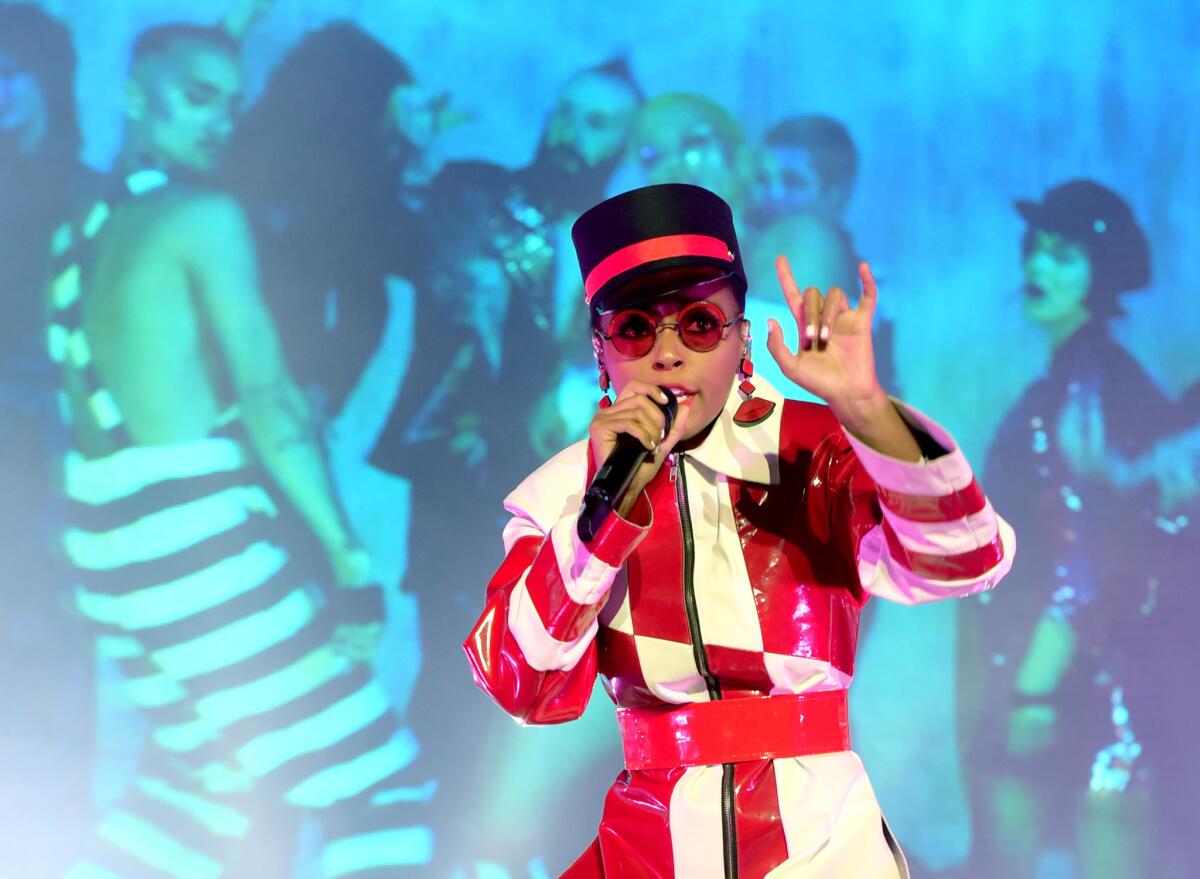Mikael Wood’s best albums of 2018: Searching for glimmers in the sprawl

- Share via
By the time he’s gotten to the song’s first chorus, Matty Healy of the 1975 has already addressed fake news, Black Lives Matter, online data breaches, America’s prison-industrial complex and his own addiction to heroin.
So you can hardly blame the frontman for sounding a note of defeat when he finally arrives at the refrain in “Love It if We Made It,” the marquee single from this wily British group’s excellent third album.
“Modernity has failed us,” Healy concludes before diving into a second verse about the Syrian refugee crisis and the untimely death of rapper Lil Peep.
Whew.
Yet the weird thing about “Love It if We Made It” — a tune that future historians could do worse than to consult to get a feeling for the nightmarish joyride of 2018 — is that it ultimately delivers reassurance: Despite all this turmoil, Healy is saying over his band’s steady but propulsive groove, he can see a path forward — and he’s hopeful the rest of us might find it too.
Searching for that pinpoint glimmer is what it’s felt like to listen to pop in a year when culture, politics and technology have combined to create an endless sprawl of information and attitude. The music has reflected our problems but promises solutions too; if nothing else, it’s reminded us that to sing along, you have to breathe.
Certainly, 2018 will be remembered for the I-do-mean-lengths that some artists have gone to in order to capture the too-much-ness of the era. Post Malone stretched 18 songs over two discs for his “Beerbongs & Bentleys,” while Drake did the same with 25 for “Scorpion.”
And Rae Sremmurd? That Southern hip-hop duo filled its triple-disc “Sr3mm” with no fewer than 27 songs that ran for close to two hours.
Of course, now that streams rather than CD sales drive chart results, these super-long albums aren’t just ambitious artistic statements; they’re also arguably designed to prevent Spotify users from ever getting the chance to stream anything else.

Which means these guys can get pretty exhausting — even (or especially) when they themselves are describing the experience of exhaustion, as Drake does over a vintage Mariah Carey sample in “Emotionless,” his song about social media’s deadening effect.
Fortunately, 2018 has also yielded a bumper crop of short, sharp projects — from Vince Staples’ 22-minute “FM!” to Tierra Whack’s “Whack World,” with 15 rap and soul miniatures at 60 seconds apiece — whose brevity is no less a response to the sprawl.
You wouldn’t call these records a force for optimism exactly: At only 22 minutes, Pusha T’s “Daytona” still contains more drug talk than a Richard Price novel. Just the sense of an idea being neatly pinned down, though — that is its own reward at a moment when so much has seemed so out of control.
What could be called a force for optimism? Kacey Musgraves’ love-drunk “Golden Hour,” about discovering that romance can bolster one’s sense of self. And Robyn’s “Honey,” a quietly ecstatic dance cut that reimagines the club as a sanctuary; to be invited by this Swedish singer into “the heart of some kind of flower” is to feel deeply protected from the world outside.
Best of 2018: A look back at the year in movies, TV, music and more »
Yet other artists have resisted the temptation to hide. Like the 1975, Janelle Monáe on “Dirty Computer” proudly situates her uplifting message — a gospel of pride and belonging — within the hate and hypocrisy she sees swirling around her.
Ariana Grande does something similar with “Sweetener,” which came out just over a year after the terrorist bombing of her 2017 concert in Manchester, England, and vividly communicates the emotional work required to move past tragedy.
That Grande has kept going through tough times this year — including her breakup with Pete Davidson and the death of ex-boyfriend Mac Miller (by an overdose some deranged fans blamed on her) — simply serves to reiterate Healy’s diagnosis from “Love It if We Made It.”
But make it Grande did: Last month, with “Sweetener” still fresh, the singer surprise-released “Thank U, Next,” a declaration of gratitude and self care that reached listeners like the pick-me-up you’d think she needs to hear.
And it’s not even 3½ minutes long.

NOW THAT THE functional equivalent of every song ever recorded is available to hear instantly on your phone, the music of a given year isn’t merely in conversation with itself anymore — it’s also talking to (and about) the music that came before.
My favorite albums of 2018 embraced that creative continuum in ways that felt eager, witty, pained, earnest or determined to disrupt.
Kacey Musgraves, “Golden Hour” (MCA Nashville). Country music’s smartest young star goes gently psychedelic, propelled into the cosmos by love.
Janelle Monáe, “Dirty Computer” (Bad Boy/Atlantic). “Young, black, wild and free” is how she describes herself on this moving and exuberant R&B album. Also: “I’m not crazy, baby — I’m American.”
The 1975, “A Brief Inquiry Into Online Relationships” (Dirty Hit/Interscope). For a guy so attuned to the internet’s psychic landscape, Matty Healy sure sounds comfortable amid the sounds of the 1980s.
Charlie Puth, “Voicenotes” (Atlantic). He knows more chords than pop stars twice his age do — and he knows just how little that does for him in the club.
Soccer Mommy, “Clean” (Fat Possum). In a year when women ruled indie rock — see also Mitski and Boygenius — Sophie Allison’s studio debut as Soccer Mommy wore its vulnerability like a weapon.
Kanye West, “Ye” (G.O.O.D. Music/Def Jam). It’s not pretty (until it is), and it wasn’t designed to be.
Troye Sivan, “Bloom” (Capitol). Top 40 pop was past due for an artist openly chronicling his life as a gay man. But the form was lucky to get a songwriter this skilled.
Juice WRLD, “Goodbye & Good Riddance” (Grade A/Interscope). An emo-rap synthesis so seamless it makes you wonder whether the early 2000s really happened.
Tori Kelly, “Hiding Place” (Schoolboy/Capitol). Just another pretty voice on her 2015 debut, she turns to gospel here and finds a reason to sing.
Eric Church, “Desperate Man” (EMI Nashville). Faced with hardship, including the death of his younger brother, the once-testy country singer responds with unexpected grace.
Twitter: @mikaelwood
More to Read
The biggest entertainment stories
Get our big stories about Hollywood, film, television, music, arts, culture and more right in your inbox as soon as they publish.
You may occasionally receive promotional content from the Los Angeles Times.










